- Home
- Julian Barnes
Before She Met Me Page 15
Before She Met Me Read online
Page 15
Graham carried on waiting. His head felt quite clear now, though his arm ached.
‘And the girl would pop it up herself, and the other women would get going, I think with ordinary candle wax, and they’d seal her up. And then they’d sell her as a virgin. If she looked too old they’d say she’d been in a nunnery and had just come out—sometimes they’d dress her as a nun for an extra turn-on. And the client would push his way past the candle wax—I dare say they used beeswax in the better class of brothel—and the girl would give a yelp and flinch and squeeze her thighs together and burst the bag and sob a little and mutter some crap to make the man feel powerful and conquering but most of all first. And then he would leave an extra big tip because he’d left his indelible mark, this was what he’d been saving up for and he’d had it and the girl hadn’t actually gone psychotic on him.’
Graham felt, whatever was coming, that he’d somehow deserved it.
‘Of course, it was more expensive, because the chicken’s blood would mess up the sheets, but then they were paying more anyway, for the virgin, and I guess the brothels had some cut-price deal with the laundries. They must have got through an awful lot of sheets, mustn’t they?’
Graham’s continuing silence, intended to convey understanding of Ann’s need for aggression, struck her as wet. That word kept easing itself into her mind. Fucking wet, she thought, fucking wet.
‘I wonder if laundries actually know they’re dealing with brothels. I mean, do you think they use extra bleach on the sheets? Do they say, here come the brothel sheets—get out the biological. Do you think they say that, Graham? I’m not asking you to do more than speculate. Is that what you think they do? Or do you think they simply treat brothel sheets like everyone else’s? Just bulk washing and never mind what gets left on them?’
Ann got up and walked across to Graham’s chair. He kept his head down. Finally he spoke.
‘Yes?’
‘Yes to what? I’ve asked you a lot of questions. Which one have you kindly agreed to answer? Yes to Have you ever been to a brothel: was it that Yes?’
‘No. I just meant, what is it?’
‘What is it? Ah, what is it? Well, I’m glad you’ve noticed it’s something. Well, what it is, Graham, what it is, is I was just thinking maybe we should buy a chicken for dinner soon. Not one of those all-washed-out ones that have been hosed through and scraped off and injected with stuff to make them taste chickeny. But a real chicken, you know, a HEN, a HEN with feathers and feet and that red thing on the top of its head. And then you could chop it up and we could drain off some of the blood. And then we could melt some candlewax together, and one night, one special night, I could be your virgin, Graham. You’d like that, wouldn’t you?’
He didn’t reply. He kept looking down. Ann stared at the top of his head.
‘I could be your virgin,’ she repeated.
Graham was immobile. She reached down and touched his hair; he flinched, and moved his head away. Then she repeated once more, and more softly this time,
‘I could be your virgin.’
Graham got up slowly, and deftly threaded his way past his wife, swaying to avoid her body, and especially her eyes, then again to avoid the coffee table. He kept looking at the carpet until he was safely at the door; then quickened his pace as he walked upstairs. He locked his study door and sat down in his chair. He didn’t come to bed all night. He sat in his chair, thinking of all that had happened since the honey time began. Why couldn’t you unknow knowledge? Call back yesterday, he wailed quietly to himself. At about four o’clock he fell asleep. There were no dreams to be had that short night.
TEN
The Stanley Spencer Syndrome
Some years ago Graham had read a fashionable work of popular zoology. Everyone cited it at the time, and some had even dipped into it. The book proved in the first part that man was very similar to lots of animals, and in the second part that he was very different. It gave you first an atavistic frisson, and then a pat on the back; it sold in millions. One detail came back to Graham: the fact that man owns not just the biggest brain of all the primates, but also the biggest penis. This had struck him as bafflingly wrong at the time—the time being when he was still tormented daily by Barbara with her net and trident, when he kept moving crabwise away from her but always tripped in the sand. Now, it seemed to make sense. It was no longer paradoxical that a huge gorilla had a tiny cock, outgunned by even the most minuscule of Graham’s students. Size didn’t relate to prowess or need: it related to the trouble factor. It hung there between your legs as a warning: Don’t expect me not to bite back.
On the one hand, of course, sex didn’t matter at all, especially not sex in the past, sex in history. On the other hand, it mattered completely; it mattered more than everything else put together. And Graham didn’t see how this state of affairs was ever going to change. It had all been decided for him up there in his brain, without consultation, years ago; decided by sodding history and his background and his parents’ choice of one another—by the unprecedented combination of genes they had thrust at him and told him to get on with.
Jack, needless to say, had got a better deal. Graham used to think that his friend was more relaxed about things simply because of his wider experience, his earned cynicism. Now he didn’t believe so: the rules were all set much earlier. Jack’s Parking Fine Principle, for instance, was the sort of precept Graham could never arrive at himself however long he lived, however frantic his activity. Jack had once been expounding his ‘maximum stealth, maximum kindness’ theory when Graham had broken in,
‘But you do get caught?’
‘No—much too careful. None of this into-the-closet-with-you stuff for me. That’s strictly for kids. At my age it’d strain the ticker too much.’
‘I meant, Sue does find out sometimes, doesn’t she?’
‘Sort of. A bit. When I forget to tuck the tail of my shirt in.’
‘And what do you do then? What do you say to her?’
‘Use the Parking Fine Principle.’
‘ …?’
‘Remember when parking meters came in? And it was all the latest technology—fines handled by computers: remember? Chum of mine discovered, quite by chance, that you could pile up lots of tickets, pay the most recent one, and the computer would automatically wipe out its memory of the earlier ones. That’s the Parking Fine Principle. Tell them about the latest, and they stop worrying their littles about the earlier ones.’
And he’d said it not cynically, or disparagingly, but with what sounded like a crisp fondness for the objects of his deceptions. That was how it was; that was how he was; that was how Graham could never be.
The clinching evidence Graham had been looking for was suggested in a simple, obvious way. He was sitting in the Odeon Holloway Road watching, for the third time that week, his wife committing onscreen adultery with Tony Rogozzi in The Fool Who Found Fortune. Rogozzi played an ordinary Italian barrow-boy given at weekends to combing the agricultural land of the Home Counties with a metal detector. One day he discovers a hoard of old coins and his life changes. He forsakes his barrow and his religion, buys lurex suits, tries to lose his comic Italian accent, and becomes estranged from his family and his fiancée. While spending his money in nightclubs he discovers Graham’s wife, with whom he has an affair, despite parental warnings:
‘She only wanna sucka you dry, bambino,’ counsels his father between forkfuls of spaghetti, ‘an thenna she tossa you away like an old shoe.’
Tony, however, perseveres in his infatuation, giving Ann expensive presents which she feigns to admire but immediately sells. But just as he is about to cash all his coins and leave his roots for ever, his parents receive two visitors: a policeman to explain that all the coins are stolen property anyway; and Ann’s old mother, who selflessly declares that her daughter is a callous gold-digger who has been openly boasting of skinning a naive young Italian. Tony, sadder but wiser, returns to his family, his fiancée, and his barrow
. During the final scene, in which Tony and his fiancée together vandalize the metal detector (rather like Adam and Eve chopping up the serpent, Graham thought), the largely Italian audience in the Odeon Holloway Road clapped and cheered.
While the rest of them absorbed a moral lesson, Graham picked up a practical idea. At one point, as Rogozzi crouched nearer the recently bejewelled Ann in a deep-buttoned restaurant, enviously watching the candlelight probe her cleavage, the temporarily lapsed barrow-boy whispered,
‘Angelica,’ (it was not her real name, but one assumed for the purposes of gulling him) ‘Angelica, I writa you a poem, likea my fellow-countryman Dante. He havea his Beatrice’ (he pronounced the name as if it were his favourite pasta) ‘an Iya havea my Angelica.’
Gotcha, Graham thought as he came out. Now if the affair began in what, 1970, 1971, that would mean there were five possible sources in which to look. Jack couldn’t have kept quiet in all of them. For a start, he simply wasn’t an inventive enough writer: if he wanted a bus conductor for a short scene, he couldn’t produce one without taking a bus ride. The conductor would then appear in his pages with some tiny adjustment—a gammy leg, a ginger moustache—which would make Jack feel like Coleridge.
And secondly, Jack’s sentimental nature had turned him, as a writer, into a diligent payer of tributes and dues. This streak, at its most basic and self-serving, emerged when Jack had once stood in for six months as a theatre critic.
‘Say you have to go to some sodding fringe play in Hammersmith or Peckham or wherever,’ the novelist had explained. ‘You can’t get out of it because your editor is keen on all that democratic shitse and you have to pretend to go along with it. You pack the old hip flask and steel yourself for a lot of anguished balls designed to change the face of society in a run of three weeks. You slump in your democratically uncomfortable chair, and after three minutes maximum the old brain is yelling, “Let me out of here.” You’re not enjoying yourself; sure, you’re getting paid to be there, but that’s not enough. It’s just not enough. So you pick out the best bit of crumpet in the play and decide she’s “a new discovery”. You start with one of those whingy intros praising yourself for having gone to the Tramshed Theatre Dalston, and then you piss on the play a bit, and then you say, “But the evening was redeemed for me by a stunning moment of pure theatre, a moment of perfect beauty and touching emotion, when Daphne O’Twat, playing the third mill-weaver, strokes her machine as if it were a beloved pet—which, in those bleak times, it probably was; the gesture, and the strange, faraway look in her eye, transcend the grime and back-breaking labour of those suffering forbears of ours, and cut through to the most cynical in the audience in a moment which arches over the brooding sky of this play like a bursting rainbow.”
‘Notice that I don’t say Miss O’Twat has got terrific tits or a face like the Venus de Milo. Your editor might rumble it, not to mention the girl concerned. Doing it this way, the editor just says, “Hey, let’s get a mug of this chick” and sends off a photog, while the girl thinks, “This could be my big break—a rave notice which doesn’t mention my tits.” So the day after the piece comes out you ring up the Ditchwater in the Round, get on to Dilys O’Muff, say you’re coming down because you’ve just got to see her deeply spiritual performance all over again, and what about having a deeply spiritual jar with you afterwards. Then you’re away. Doesn’t always work. Works often enough, though.’
This was Jack’s ‘tribute’ system at its crudest. But he also liked to decorate his more serious texts with what he called ‘toasts and teases’. The toasts were hidden moments of praise for his friends and heroes; the teases were points at which he rubbished people he disliked. It made writing more fun, Jack insisted. ‘Gives you an extra motivation when you feel you’ve hewn enough truth for one day.’
Graham knelt in front of Ann’s shelves. There were ten of them: The Works of Jack Lupton. Five he didn’t need; the other five, starting with Out of the Dark, he removed. To cover up the hole in the shelves, he pushed up Doris Lessing on one side and Alison Lurie on the other; then fetched a couple of his own Mary McCarthys and shoved them in further along. That looked okay.
He carried the five novels up to his study. He hadn’t skimmed books in the way he was doing now since adolescence. In those days, too, he’d been skimming for sex: after all, fiction was where you went when parents and encyclopaedias failed. A practised eye could make words like ‘brassière’, ‘bosom’ and ‘loins’ stand out from the text as if printed in bold type. This time, there were no obvious key words to look for.
Thank God he didn’t have to wade through Jack’s first five books. The first three—’my Lincolnshire poacher days’ as Jack would mock-modestly categorize them—were taken up with what the novelist called ‘the task of putting my family on the fictive shelf’. Next came three ‘novels of sexual and political conflict’, the last of which Graham would have to flip through. Finally there were the latest four, where the social, political and sexual ambitions and guilts which animated the first six had died away, where all the characters took on a cynical wash, where it didn’t really matter who did what to whom, and whether things ended well or ill: they were moving towards stylized comedies of manners in high-bohemian settings. Soon, Graham hoped, Jack would turn into a latter-day Firbank, which would not only amount to a neat revenge on the reputedly earthy writer, but also ensure that nobody would ever want to read or publish Lupton ever again. And by that time he would be so pickled in his own manner that he’d be unable to change.
The last of the politico-sexual novels, Out of the Dark, had been published in 1971. In it, Graham remembered, Jack was lightly disguised as a bearded junior minister who, shortly before election time, engages in a liaison with Sarah, an attractive lobby correspondent; his ten-year marriage to a competent home-maker has begun to stale. Soon, the wife finds out and starts blackmailing the Jack-figure: either give up the girl, or I’ll expose you to the papers and make sure you lose both your marginal seat and custody of the children. ‘Jack’ prepares to defy convention and put his case before the electorate and the divorce courts, when Sarah selflessly argues the case for the Party (even though, ironically, it is not her party) and the children (another irony, since she is pregnant by ‘Jack’ but hasn’t told him, and intends having a secret abortion). ‘Jack’ is finally persuaded that there are times when principles must hold sway over the call of the heart; when Sarah heroically leaks to him the social security cuts her party plans for after the election, he reflects on the plight of working families and their need for his presence in the next parliament, and finally accepts the correctness of her decision. Before they part, however, they make love one last time:
Jock [as Jack was called in the novel] caught her with urgent force. He was as capable of being fierce and demanding as he was of being soft and gentle. This time he was fierce and demanding. Sarah knew him in both modes, loved him in both modes. As he pushed himself on top of her, she breathed deep the rough male smell of cigarette smoke emanating from his beard. This excited her. She had had enough in her time of namby-pamby aftershave exquisites—men who looked like men but might as well be women.
‘Jock,’ she murmured in protest as his hand roughly pushed at her skirt.
‘Yes, yes,’ he replied urgently, commandingly. ‘Here. Now.’
And there, then, on the sofa, roughly he took her. He would brook no protest, and found indeed that his imperious desire had provoked in Sarah an answering wetness. He kissed the small mole on the left side of her neck, and she raised her loins to him. Then, fiercely, and still wearing the brown tweed suit which had been made from cloth woven in his constituency, he entered her, gathered her up in his strength, and launched them both higher than ever before—high, high above the earth, through the clouds to where you find the sun and where the sky is always blue. At the peak of their transport he gave a great cry, as of a wounded beast, and a small tear escaped the confines of her right eye.
‘Jock,’ she
whispered, ‘there’ll never be another … ’
‘No,’ he replied with gentle mastery, ‘there will … ’
‘Never,’ she cried, almost in pain.
‘Not now,’ he assured her, ‘not soon. But sometime, there will be another. And I shall want it that way too. I shall still be out there, somewhere, wanting it for you.’
He quieted her last protests and, still inside her, reached into his jacket and handed her a cigarette. Absently, she placed the untipped end in her mouth and waited for him to light the cork. Gently, he took it from her lips, and turned it round. She was always doing that … As he lit the proper end, he noticed a slight smear of lipstick on it—the final, melancholy smear, he reflected, that had escaped being rubbed off in their soaring exchange of kisses …
Pages 367 and 368: Graham ripped them out. The clues were unmissable: the tear in the eye—that had happened a few times; the lifting of the bottom—yes; the clincher, though, was the mole—even if he had moved it from her right shoulder to the left side of her neck (this would be what Jack called imagination). And even if the mole wasn’t a clincher, there was the cigarette. Ann often put cigarettes into her mouth the wrong way round. Graham hadn’t ever noticed her doing it after they made love, but she’d done it several times when socially flustered. Hadn’t Jack been there on one such occasion? And hadn’t there been some shared joke he didn’t understand? He couldn’t quite remember.
He flipped through Out of the Dark for a hundred pages or so on either side of the passage he’d just discovered, and tore out all the other references to Ann’s affair with Jack. He could read them through later. Then he turned his attention to the last four Lupton novels. Novellas, really: the start of the neo-Firbank period, Graham repeated gleefully to himself. Jack’s explanation was different.

 The Sense of an Ending
The Sense of an Ending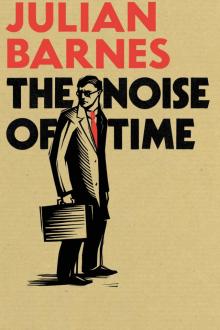 The Noise of Time
The Noise of Time Metroland
Metroland Letters From London
Letters From London Before She Met Me
Before She Met Me Pulse
Pulse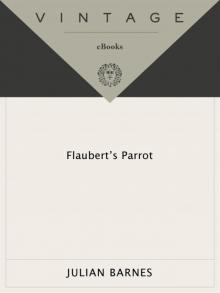 Flaubert's Parrot
Flaubert's Parrot England, England
England, England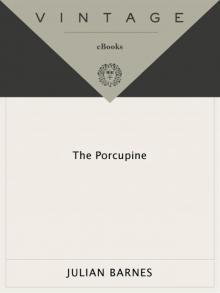 The Porcupine
The Porcupine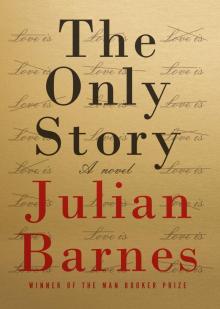 The Only Story
The Only Story Love, Etc
Love, Etc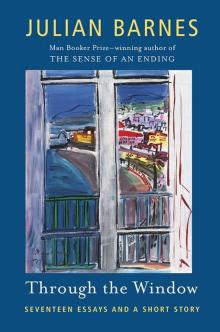 Through the Window: Seventeen Essays and a Short Story
Through the Window: Seventeen Essays and a Short Story Staring at the Sun
Staring at the Sun Cross Channel
Cross Channel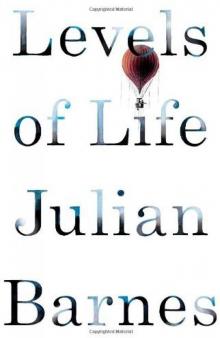 Levels of Life
Levels of Life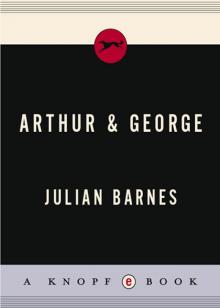 Arthur & George
Arthur & George Love, Etc.
Love, Etc. A History of the World in 10 1/2 Chapters
A History of the World in 10 1/2 Chapters Something to Declare
Something to Declare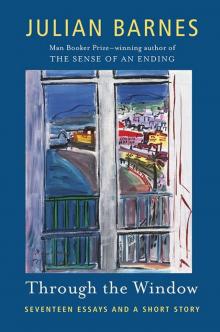 Through the Window: Seventeen Essays and a Short Story (Vintage International)
Through the Window: Seventeen Essays and a Short Story (Vintage International)